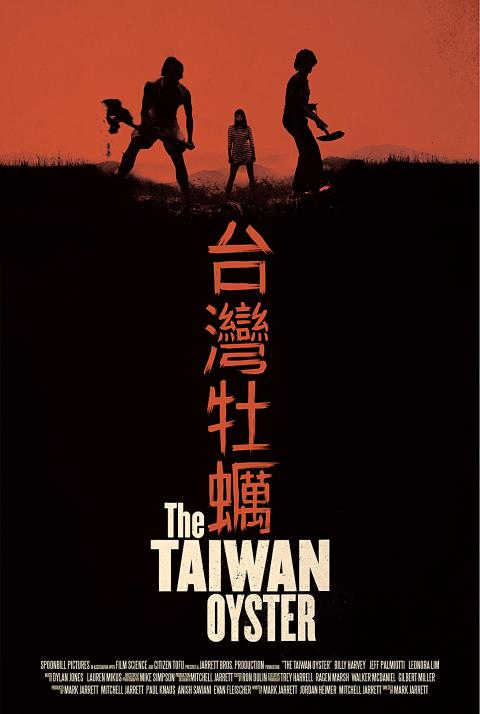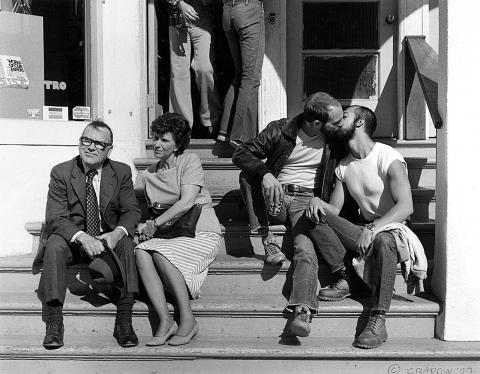Over the past decade, the Urban Nomad Film Festival has brought some of the most exciting and thought-provoking indie films from around the world to Taipei. Now in its 11th edition, the event runs from Thursday to April 22 at Huashan 1914 Creative Park (華山1914). Films will cover topics ranging from writer William S. Burroughs to Filipino exploitation movies.
Though this year’s theme is ostensibly art and technology, Urban Nomad founders David Frazier and Sean Scanlan seek a broad range of submissions every year. Since launching in 2002, Urban Nomad has cultivated a youthful audience filled with socially aware, culturally savvy viewers.
Culture, technology and activism “are the three really big areas that are happening in terms of documentary right now,” says Frazier. “We’ve found a really awesome audience for these films in Taiwan. I don’t know if it was so obvious before we started showing these kinds of movies.”

Photo courtesy of Urban Nomad
This year’s festival starts on Thursday next week with The Taiwan Oyster, a US feature-length drama directed by Mark Jarrett, who lived in Taichung from 1999 to 2001. Two expat English teachers steal the body of a coworker after he dies in an accident and travel with it across Taiwan, determined to give their former colleague a proper burial and make it to Spring Scream on time.
“It is the first film that talks about what it is like to be an English teacher here, what it is like to consider life and death, and the reality of making your home in a foreign country. And it is totally about Taiwan,” says Frazier.
“If you look at Taiwanese cinema, it is all very much in the eyes of the Taiwanese. So to see a foreign director come here and produce a different interpretation of this country is very interesting and also needed,” he adds.

Photo courtesy of Urban Nomad
Singaporean director Tan Siok Siok’s (陳惜惜) Twittamentary, which screens on April 22, offers viewers an interactive experience. The film originated as a crowd-sourcing experiment in which Twitter users were invited to contribute story ideas, videos and other media. Tan then took a road trip across the US to interview users of the microblogging platform, including a homeless woman, a prostitute who uses Twitter as a personal “GPS” and Huffington Post founder Arianna Huffington. The film will be shown in dual screen mode with a “live” Twitter wall that users can contribute to using the hashtag #twittamentary.
Other films in this year’s lineup include Morgan Spurlock’s latest documentary The Greatest Movie Ever Sold, which tackles the ubiquity of product placement, marketing and advertising in US culture.
Recommended to Frazier by an Urban Nomad audience member, Kinshasa Symphony is about Central Africa’s only symphony orchestra, based in the capital of the Democratic Republic of Congo. The German documentary, which will be shown on April 22, follows the lives of the musicians, many of whom are self-taught, as they live among the 10 million inhabitants of one of the world’s poorest cities. Directed by Claus Wischmann and Martin Baer, Kinshasa Symphony has already won more than 15 awards at film festivals across the world.

Photo courtesy of Urban Nomad
Australian director Mark Hartley pays tribute to Filipino genre movies of the 1970s and 1980s in Machete Maidens Unleashed! Cheap labor, exotic scenery and non-existent health and safety regulations created an anything-goes environment for exploitation filmmakers, including cult movie icons like Roger Corman, Joe Dante, John Landis, Sid Haig and Eddie Romero, all of whom are featured in interviews in the film. Machete Maidens Unleashed! screens on April 16 and April 21.
Other festival movies focus on art and culture, including Lemmy, a 2010 documentary about Motorhead frontman Lemmy Kilmister, Jean Michel Basquiat: The Radiant Child, William S. Burroughs: A Man Within, Everyday Sunshine: The Story of Fishbone and PressPausePlay, a Swedish film that asks if the digital democratization of culture has really resulted in better art, film, music and literature.
Viewers interested in activism and social justice may find the following films noteworthy: If a Tree Falls, a 2012 Oscar nominee for best documentary that examines the fringe of American’s environmental movement; We Were Here, about the onset of the HIV/AIDS crisis in San Francisco’s gay community and how it helped turn the fight for gay rights into a bona fide political movement; GrowthBusters, in which director and activist Dave Gardner argues that urban growth and uncontrolled development in the US has led to a lower standard of living for Americans; and the 2011 French documentary Greenpeace: The Story.

Photo courtesy of Urban Nomad
This year, viewers can enjoy Urban Nomad’s short film happy hour for free with a ticket to any 7pm screening (regular admission is NT$50). While the festival’s short film segment provides up-and-coming filmmakers with an invaluable platform, it also allows established directors and producers to showcase independent projects.
Chuang Ching-shen (莊景燊), the director of popular Taiwanese documentary Jump! Boys (翻滾吧!男孩), teamed up with legendary producer Wang Tung (王童) to create Reflection (美麗鏡界). In the movie, actress Chamder Tsai (蔡燦得) portrays a woman divided between her job as a caretaker for three boys with learning difficulties and a life of comfort with her husband. Another notable entry is Time of Cherry Blossoms (櫻時), a gorgeous anime film that Frazier compares to Spirited Away. In the animation, a young boy has a phantasmagorical encounter with an array of deities after wondering into a dilapidated temple in the Taiwanese countryside.
Short films screen on April 13 and from April 16 to April 20 starting at 6pm every night, before the feature-length films. For a complete short film schedule and descriptions, visit urbannomaden.blogspot.com/p/short-film-info.html

April 14 to April 20 In March 1947, Sising Katadrepan urged the government to drop the “high mountain people” (高山族) designation for Indigenous Taiwanese and refer to them as “Taiwan people” (台灣族). He considered the term derogatory, arguing that it made them sound like animals. The Taiwan Provincial Government agreed to stop using the term, stating that Indigenous Taiwanese suffered all sorts of discrimination and oppression under the Japanese and were forced to live in the mountains as outsiders to society. Now, under the new regime, they would be seen as equals, thus they should be henceforth

Last week, the the National Immigration Agency (NIA) told the legislature that more than 10,000 naturalized Taiwanese citizens from the People’s Republic of China (PRC) risked having their citizenship revoked if they failed to provide proof that they had renounced their Chinese household registration within the next three months. Renunciation is required under the Act Governing Relations Between the People of the Taiwan Area and the Mainland Area (臺灣地區與大陸地區人民關係條例), as amended in 2004, though it was only a legal requirement after 2000. Prior to that, it had been only an administrative requirement since the Nationality Act (國籍法) was established in

With over 80 works on display, this is Louise Bourgeois’ first solo show in Taiwan. Visitors are invited to traverse her world of love and hate, vengeance and acceptance, trauma and reconciliation. Dominating the entrance, the nine-foot-tall Crouching Spider (2003) greets visitors. The creature looms behind the glass facade, symbolic protector and gatekeeper to the intimate journey ahead. Bourgeois, best known for her giant spider sculptures, is one of the most influential artist of the twentieth century. Blending vulnerability and defiance through themes of sexuality, trauma and identity, her work reshaped the landscape of contemporary art with fearless honesty. “People are influenced by

The remains of this Japanese-era trail designed to protect the camphor industry make for a scenic day-hike, a fascinating overnight hike or a challenging multi-day adventure Maolin District (茂林) in Kaohsiung is well known for beautiful roadside scenery, waterfalls, the annual butterfly migration and indigenous culture. A lesser known but worthwhile destination here lies along the very top of the valley: the Liugui Security Path (六龜警備道). This relic of the Japanese era once isolated the Maolin valley from the outside world but now serves to draw tourists in. The path originally ran for about 50km, but not all of this trail is still easily walkable. The nicest section for a simple day hike is the heavily trafficked southern section above Maolin and Wanshan (萬山) villages. Remains of